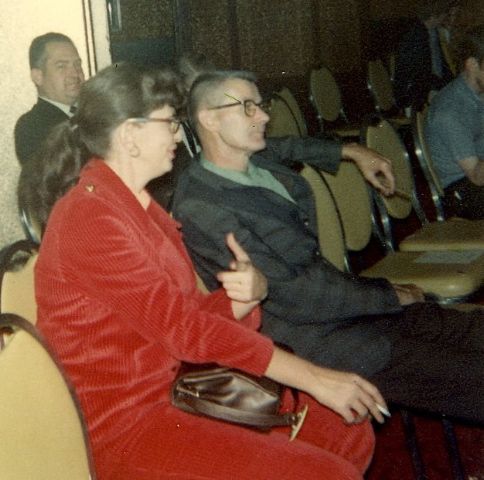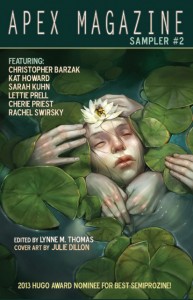Here are 10 developments of interest to fans.
(1) For his author profile “Harlan Ellison Isnt Dead Yet” Jaime Lowe was allowed to page through Harlan’s scrapbooks —
There was a newspaper clipping of his arrest for violating a weapons law when police found brass knuckles, a loaded revolver, a dagger, and a switch-blade knife in his apartment, all left over from his participatory account of hanging out with the Red Hook Brooklyn Barons street gang (republished last year in a Kicks Books anthology). There were clippings documenting feminist outrage at the movie version of Ellison’s short story “A Boy and His Dog,” starring Don Johnson. Pictures of young handsome Ellison, almost always in mid-proclamation and dressed in outfits that would make Stevie Wonder blush, were in no short supply. And, of course, the artifacts of rage past: red sticker dots blotting out the face of the author Forrest Ackerman for indeterminate grievances; a Western Union Telegram from October 16, 1967, reading, “May 10,000 Mongrel Dragons rip from your opulent structure that niggardly portion which is your heart and feed upon its rock hard substance while stamping your accursed soul to dust. Luv, Bunny.”
(2) Manifest Destiny, a comic book by Chris Dingness coming in November, imagines Lewis and Clark’s journey going a lot differently. Explains Dingness: “The reason we got the Louisiana Purchase for so cheap from Napoleon was because the land west of the Mississippi was full of dangerous creatures and monsters.”
Q: Are you such a history buff you zeroed in on these two guys immediately?
I was on vacation with friends, I was drinking and complaining about how there’s this new trend in pop culture of taking historical figures — real ones like Abraham Lincoln or fake ones like the characters in Sense & Sensibility or Pride & Prejudice — and throwing them into this monster-killing fictional universe. I was like, “God, you can just take anything. You could just take Lewis and Clark, and instead of exploring America, they were really killing monsters!” And then suddenly, I was like, “Wait that could actually be fun.” I stopped complaining about it and started trying to find a way to make money off of it, like any good American.
(3) In the early 1960s NASA leaders debated how to answer women who wanted to be astronauts. The idea of female astronauts was not acceptable to (then) Vice President Lyndon Johnson, as scholars have now documented.
It was a draft letter written by President Johnson’s assistant Liz Carpenter in response to the increasing media attention devoted to women like Jackie Cochran, Jerrie Cobb, and the other so-called “Mercury 13.” For over a year, those women had been publicly speaking and agitating about the issue, and two of them were about to meet with Johnson. In advance of his meeting with the women, Carpenter drafted a letter for Johnson that asked NASA administrator James Webb to look into the issue…
Johnson chose not to send the letter. Instead, in large script he wrote at the bottom “Lets stop this now! File” Liz Carpenter duly filed the letter and it remained unknown for four decades, until Ms. Weitekamp unearthed it.
A copy of the letter is posted at The Space Review.
(4) Bruce Arthurs argues ”Reporting Convention Harassment Protects Everyone” —
So, goddamn, ladies, REPORT, REPORT, REPORT! Because not only does it make it possible to have real consequences for harassers and to deter other harassers, it allows someone who’s been misidentified or falsely accused to try and clear their name.
(5) Did anyone like the ending of the latest Superman movie? The way people talk about the movie it should have ended with a refund! But help is on the way. The animators at How It Should Have Ended show how Superman could have been saved.
HISHE has “improved” endings for a lot of other sf movies, as well.
(6) Jade Falcon’s how-to article about podcasting is one of the highlights of Geek Girl Crafts Podzine #4 [PDF file].
There’s a misconception that podcasting is rather difficult (as in complex). When, in fact, with the plethora of today’s technology, podcasting is actually rather simple.
The “difficulty” in podcasting lies in the fact that there is work that does need to happen, and to get a good quality podcast, there are extra steps that need to happen, such as editing. And of course, there’s also the hard part of actually planning and scheduling your podcast times
That work thing sure gets in the way of a lot of fanac….
(7) Steve Fahnestalk’s autobiographical Fan History Part 3 at the Amazing Stories blog comes with a superb photo of Larry Niven wielding a light saber.
(8) Gary Farber’s discussion of genocide as an accepted science fiction story resolution has been picked up by James Davis Nicoll and his readers in The … Gomphothere Book of Genocide:
Over on FB, Gary Farber said:
It occurs to me that a list of genocide-was-the-only-solution-let’s-not-worry stories in sf could be interesting. Certainly finding another way wasn’t a concern of E. E. Smith, who wiped out evil races with a sun ray here and a smashing planet there.
A hundred comments prove this is a game every fan can play.
(9) Paul Krugman’s Conscience of a Liberal blog at the New York Times posted his photo of Laurie Penny, Tony Cunningham, Ken MacLeod, Andrew J. Wilson, Charlie Stross in “Single Malts and Science Fiction.”
(10) The Motely Fool’s “5 important tips for success from Scrooge McDuck”, says David Klaus, is “Good financial advice via someone whose cash reserves alone (out of his much vaster total fortune) comprise three cubic acres of money in a giant bin the size of the Vehicular Assembly Building at Cape Canaveral.”
Work harder (but smarter) than everyone else, and keep an eye out for con men
In “The Last of the Clan McDuck,” 10-year-old Scrooge is an unsuccessful shoeshine boy on the streets of Glasgow until his father contrives a trick. The elder McDuck sends a filthy ditch-digger to his son with an American dime — Scrooge’s Number-One Dime — which Scrooge receives after half an hour of exhausting shoeshine work. Scrooge feels cheated by the useless foreign coin, but he also learned two lessons: “Life is filled with tough jobs, and there’ll always be sharpies to cheat me … well, I’ll be tougher than the toughies and sharper than the sharpies, and I’ll make my money square!”
More wisdom from the commenter who pointed to this 30-second video: “I think it’s important that one learns from Scrooge that when diving into your vault of gold, you need to go head first. Then keep swimming. And bring a spare set of clothes.”
[Thanks for these links go out to David Klaus, Martin Morse Wooster and John King Tarpinian.]




